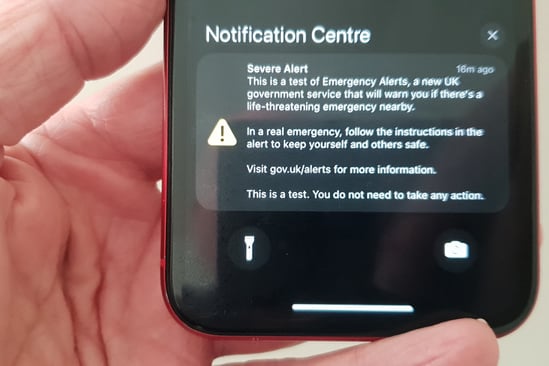A national emergency alert is due to be tested throughout the South West on Sunday, September 7.
The government will send a test emergency alert to mobile phones across the West Country and the rest of the UK at around 3pm as part of plans to strengthen the preparedness for emergencies.
The Emergency Alerts System is used to warn if there’s a danger to life nearby, including extreme weather. It allows vital information and advice to be sent to people rapidly in an emergency.
During the test, mobile phones across West Devon and beyond will vibrate and make a loud siren sound for roughly ten seconds, even if they are set to silent. A message will also appear on phone screens, making it clear the alert is only a test.
There are approximately 87 million mobile phones in the UK.
The test will be the second of the newly introduced mobile phone alerts, following a commitment to regular tests, ensuring they work and to familiarise everyone with the alerts, as in other countries.
Ahead of the national test, the government will be running a public information campaign including communications targeted at vulnerable groups, such as victims of domestic abuse. The campaign will also use British Sign Language.
Pat McFadden, Chancellor of the Duchy of Lancaster, said: “Emergency alerts have the potential to save lives, allowing us to share essential information rapidly in emergency situations including extreme storms. Just like the fire alarm in your house, it’s important we test the system so that we know it will work if we need it.
“This test is part of our action plan to build resilience across the whole country and secure the nation under the Plan for Change, from the £1 billion we’re investing in a new network of National Biosecurity Centres to the £4.2 billion we’re investing to build a new generation of flood defences to protect local communities.”
Since the first national test of the Emergency Alerts System in April 2023, five alerts have been sent, including during major storms when lives were at risk.
The largest ever use of the system saw approximately 4.5 million people in Scotland and Northern Ireland receive an alert during Storm Éowyn in January 2025, after a red weather warning was issued, meaning there was a risk to life.
Approximately 3.5 million people across Wales and the South West of England received an alert during Storm Darragh in December 2024. The storm went on to kill two people.
Other activations have included when an unexploded World War II bomb was discovered in Plymouth.
This autumn will also see the Department for Health and Social Care and the UK Health Security Agency deliver the largest pandemic exercise in the country’s history.
For the first time, the government can reveal that preparations for pandemic exercise, ‘Exercise Pegasus’, are already underway. Exercise Alkarab, an initial simulation, took place in May with more than 150 participants from across the UK, including health officials and government ministers.

.jpg?width=209&height=140&crop=209:145,smart&quality=75)



Comments
This article has no comments yet. Be the first to leave a comment.